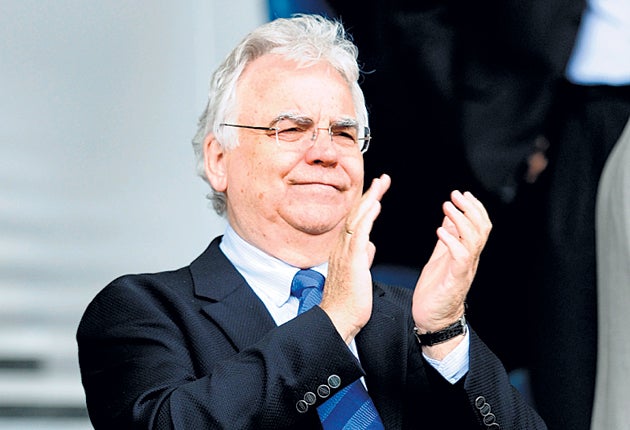The Last Word: Everton fans split in half but I must come down on side of Kenwright

The BBC's impartiality, or otherwise, is generally mentioned in connection with its interpretation of British politics, or unrest in the Middle East, rather than internecine rumblings at Everton Football Club.
Nevertheless, bobble hats off to the Corporation for admirably balanced reporting during last Saturday's Match of the Day, which, as part of its coverage of the fixture against Aston Villa at Goodison Park, featured not just the pre-match march by disgruntled Evertonians calling on chairman Bill Kenwright to sell the club, but also, once the game was under way, a loud and unequivocal burst of applause for Kenwright when his face appeared on the big screen.
Despite the media attention given to the forces of disgruntlement, who have named themselves the Blue Union, Kenwright still enjoys the support of a majority of Everton fans, many of whom understand that the portentous old enjoinder to be careful what you wish for applies in spades to ownership of a Premier League football club. Moreover, it is not a matter of partisanship but plain fact that nobody has done more than Kenwright to attract large-scale investment in, and to find a new owner of, the club he loves with possibly too much passion.
Now, a few weeks ago in this space, I wrote a flippant, rather ill-considered column that I later regretted, about the bareness of the coffers at Goodison and the financial constraints under which David Moyes has had to work.
That the manager's hands are currently tied in the transfer market is unarguable, but he is a man whose ambitions are balanced by his principles, which is not an equation you find everywhere in football. The money he has been given down the years, not only for transfers but also to sustain wage increases, is negligible only by comparison with what some of his Premier League counterparts have been handed. In the context of a sensibly run business, it has been considerable, maybe even excessive. Moyes knows it. He knows, I think, that Everton dwell rather closer to economic reality than most clubs in the Premier League, starting with the US-bankrolled institution across the park.
Unfortunately, rational expenditure tends not to be how trophies are won these days, but even so I wouldn't mind betting that Moyes views Kenny Dalglish's extravagant splurges in the transfer market with something less than envy. In a way, Moyes was born too late. Along with some other fine football men who will probably never know what it feels like to sanction a payment of £35m and upwards on a player, he deserves to have operated in an era before the game's credo was "who spends, wins".
As for Kenwright, if he could go backwards in time, I don't suppose he would have mortgaged his home and office building to buy Everton, not if he'd known the scale of abuse, up to and including death threats, that was in store for him. And as so often with abuse and death threats, they have been ignited not by insight but ignorance, which brings me back to my regrettable column of 20 August, this Everton fan's emotional response to the chairman's revelation, in a discussion with three Blue Union representatives that he thought was confidential, that Keith Harris, the broker charged with finding a buyer, had unearthed a couple of hoaxers.
What I didn't know then, and do now, was the extent of the hoax. The theatrical impresario in Kenwright probably thought he'd seen every kind of chicanery in Shakespeare plays, not to mention every dimension of greed, betrayal and injustice. Then he bought and attempted to sell a Premier League club. I, for one, owe him an apology.
Forget Murray, we are great at squash
If you stopped 10 people in an English high street, or even 10 people on their way to play squash in an English sports centre, how many of them would know that the world's No 1 squash player is an Englishman, and moreover that he is one of seven Englishmen in the world top 30? It might alleviate the agonising over Andy Murray's bad luck to be operating in the age of Djokovic, Nadal and Federer, if we turned to another racket sport and rejoiced in the success of 31-year-old Nick Matthew from Sheffield.
Yet Matthew's No 1 status is being fiercely contested by the Egyptian world No 2, Ramy Ashour, who has beaten him twice in the last month. No fewer than six former world No 1s, and 16 of the current top 20, are competing in the forthcoming Rowe British Grand Prix in Manchester, which starts next week, but it is Matthew and Mansour who should contest the final on 25 September, with official top-dog status as the prize. It really is time we started paying attention to squash.
Serena punishment is not fine by me
Following her boorish outburst during the US Open singles final, in which she told umpire Eva Asderaki that she despised her and encouraged heaven knows how many children to throw tennis-court tantrums, Serena Williams claimed not to remember what she had said, and cheerfully passed it all off as a consequence of being "focused". The tournament referee then levied a fine of $2,000. I'm not sure which I find more offensive, the crime or the punishment.
Subscribe to Independent Premium to bookmark this article
Want to bookmark your favourite articles and stories to read or reference later? Start your Independent Premium subscription today.

Join our commenting forum
Join thought-provoking conversations, follow other Independent readers and see their replies